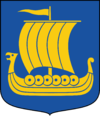Lidingö Municipality
| Lidingö kommun | ||
|---|---|---|
| Municipality | ||
|
||
| Country | Sweden | |
| County | ||
| Seat | Lidingö | |
| Area | ||
| • Total | 51.05 km2 (19.71 sq mi) | |
| • Land | 30.8 km2 (11.9 sq mi) | |
| • Water | 20.25 km2 (7.82 sq mi) | |
| Area as of January 1, 2014. | ||
| Population (December 31, 2016) | ||
| • Total | 46,853 | |
| • Density | 920/km2 (2,400/sq mi) | |
| Time zone | CET (UTC+1) | |
| • Summer (DST) | CEST (UTC+2) | |
| ISO 3166 code | SE | |
| Province | Uppland | |
| Municipal code | 0186 | |
| Website | www.lidingo.se | |
| Density is calculated using land area only. | ||
Lidingö Municipality (Lidingö kommun semi-officially named as Lidingö stad) is a municipality east of in in east central Sweden. Its seat is located on the island of Lidingö. The municipality is a part of .
It is chiefly located on the island Lidingö, but also incorporates a few smaller islands in the surroundings, most notably the islets Fjäderholmarna within the .
Being an island municipality it has not been amalgamated with any other entities. The small island of Tranholmen has, however, been transferred to Danderyd Municipality. The rural municipality was made a market town (köping) in 1910, a city in 1926 and a unitary municipality in 1971.
The municipality always refers to itself as Lidingö stad ("the City of Lidingö"). This was a decision taken by the municipal assembly (kommunfullmäktige) in 1992.
The island Lidingö is connected to the city of by the two bridges of Lidingöbron. One is for cars and one for the Lidingöbanan suburban tramway and pedestrians. The bridges lead directly to Ropsten, a station on the .
Lidingö is for statistical purposes divided into three localities: Lidingö, Brevik and Sticklinge udde. Because of the strait Lilla Värtan separating the island Lidingö from central , Lidingö statistically is not counted as a part of Stockholm.
Lidingö traces its history to at least 600 BC, from when remains have been found. According to legend, Lidingö was a place where the Vikings would gather before setting sails to eastern areas, however no proof have been found to confirm that theory. When the city arms was to be chosen in 1928 a Viking ship became the motif, in the colors of the Swedish flag. Lidingö was first mentioned in writing in 1328, called Lydhingö when the entire island and the farms were owned by Bo Johnsson Grip. On a map from 1661 the island is called Lijdingeöö.
...
Wikipedia

